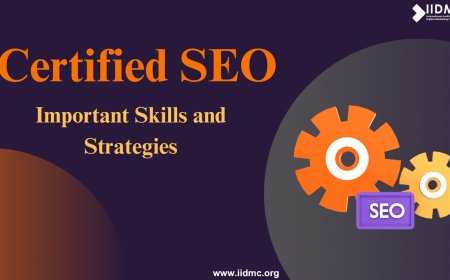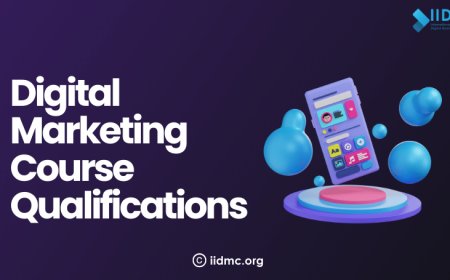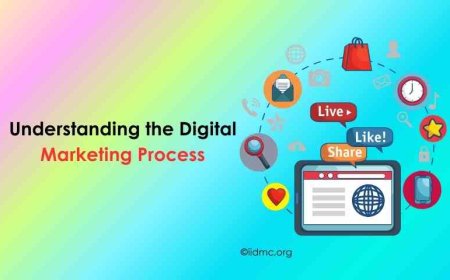What Does a Digital Marketer Do?
Learn what a digital marketer does, including managing social media, optimizing SEO, creating content, running email campaigns, and handling paid advertising to boost brand visibility and engagement.
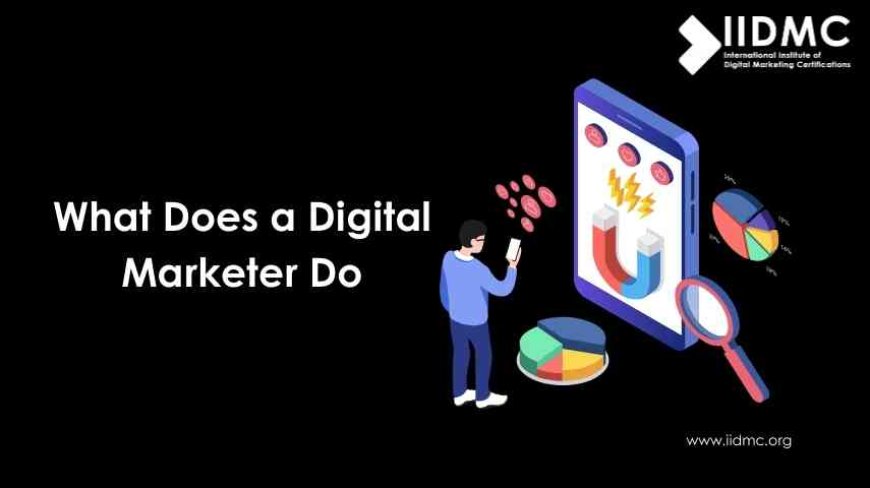
A digital marketer plays a crucial role in promoting businesses online by utilizing a range of strategies to boost brand visibility, engagement, and sales. From managing social media campaigns to optimizing websites for search engines, digital marketers employ tools like SEO, content creation, email marketing, and paid ads to connect with target audiences. Their goal is to drive traffic, generate leads, and convert prospects into customers. With the ever-evolving world of digital platforms, digital marketers need to stay ahead of trends and continuously refine their approach to maintain a competitive edge in the market.
What is digital marketing?
Digital marketing refers to the use of digital channels, platforms, and technologies to promote products, services, or brands to a targeted audience. It includes various online methods such as social media marketing, search engine optimization (SEO), email marketing, content marketing, and paid advertising.
Key components of digital marketing include:
-
SEO (Search Engine Optimization): Enhancing a website's visibility on search engines to attract organic traffic.
-
Social Media Marketing: Using platforms like Facebook, Instagram, LinkedIn, and Twitter to engage and connect with customers.
-
Email Marketing: Sending promotional emails to nurture leads and convert them into customers.
-
Content Marketing: Creating and distributing valuable content to attract and engage a target audience.
-
Paid Advertising: Running ads on search engines (Google Ads) or social media platforms to drive traffic and increase conversions.
Digital marketing is crucial for businesses to reach their audience effectively in today's digital world.
Essential Skills Required for Digital Marketers
-
Analytical Thinking
Digital marketers must possess strong analytical skills to interpret data, measure campaign success, and make data-driven decisions. Understanding metrics from platforms like Google Analytics helps optimize strategies for better performance. -
Creativity and Communication
Creativity is key in crafting engaging content that resonates with the audience. Effective communication skills are essential for conveying messages clearly and persuasively across different platforms and mediums, whether through social media posts, email campaigns, or content marketing. -
Technical Skills
A digital marketer should be proficient in tools like SEO software, Google Analytics, and social media management platforms. Knowledge of search engine optimization (SEO), pay-per-click (PPC) advertising, and content management systems (CMS) allows for more efficient campaign management and website optimization.
Developing these skills will enable digital marketers to adapt to the ever-changing digital world and improve business success.
Digital Marketing Strategies and Tools
-
Popular Tools for Digital Marketing
-
Google Analytics: A powerful tool for tracking website traffic, user behavior, and campaign performance. It helps marketers measure the effectiveness of their strategies by providing insights into audience demographics, traffic sources, and conversions.
-
HubSpot: A comprehensive platform offering tools for inbound marketing, CRM, email campaigns, social media management, and lead tracking. HubSpot helps marketers automate tasks and nurture leads.
-
SEMrush: A tool designed for SEO and competitive analysis. SEMrush provides keyword research, backlink audits, and competitor insights to help optimize content and boost search engine rankings.
-
Digital Marketing Strategies
-
Content Marketing: This strategy focuses on creating valuable, relevant content to attract and engage a target audience. Content marketing includes blog posts, videos, infographics, and eBooks, all designed to build brand awareness and establish authority.
-
Influencer Marketing: Involves collaborating with influencers or industry experts to promote products or services to their followers. Influencers help brands tap into their established audience and build trust through authentic recommendations.
Utilizing these strategies and tools can enhance brand visibility and foster long-term customer relationships in the digital world.
Key Roles of a Digital Marketer
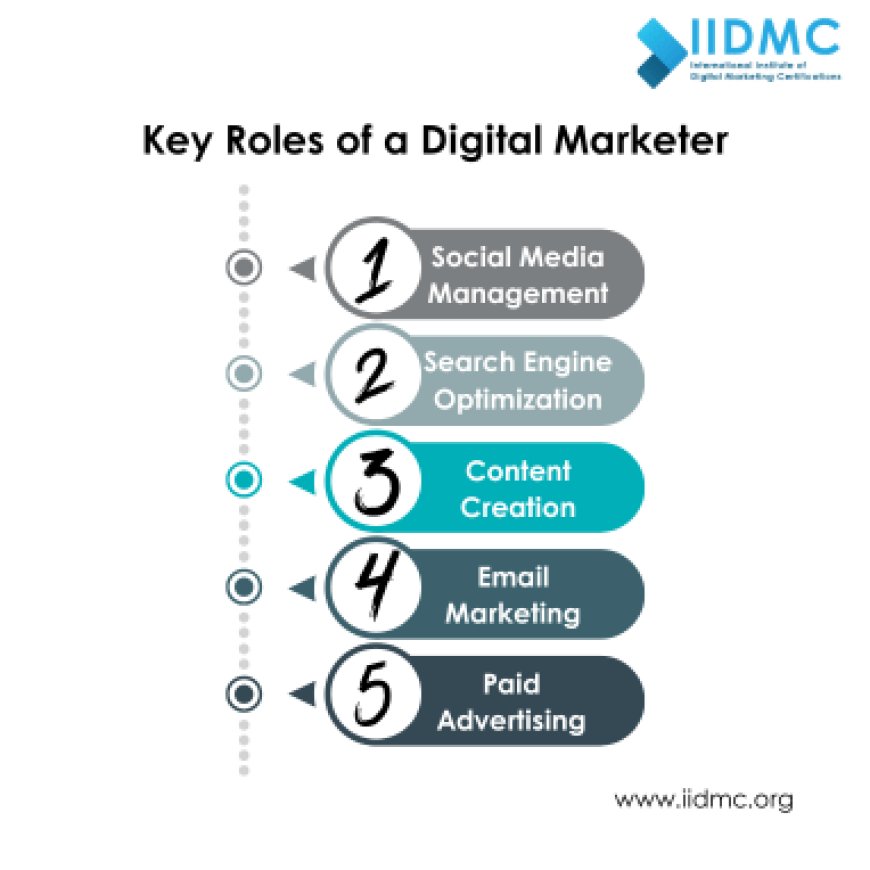
1.Social Media Management
-
-
Creating and Scheduling Posts: A digital marketer is responsible for planning, creating, and scheduling content across various social media platforms to maintain brand presence and engage with the audience.
-
Engaging with Followers: Building relationships with followers by responding to comments, messages, and inquiries helps foster brand loyalty and improve customer experience.
-
-
SEO (Search Engine Optimization)
-
Improving Website Ranking: By optimizing on-page and off-page elements, digital marketers enhance the website's ranking on search engines like Google.
-
Driving Organic Traffic: SEO efforts aim to attract more organic traffic, which increases visibility and the likelihood of conversions without relying on paid ads.
-
-
Content Creation
-
Developing Engaging Content: Creating high-quality content, such as blog posts, website copy, and social media updates, is essential for attracting and retaining customers. Digital marketers ensure content aligns with brand messaging and audience preferences.
-
-
Email Marketing
-
Crafting Targeted Email Campaigns: Digital marketers design and execute personalized email campaigns aimed at generating leads, nurturing prospects, and retaining customers through consistent engagement.
-
-
Paid Advertising (PPC)
-
Managing Paid Campaigns: Digital marketers oversee pay-per-click (PPC) campaigns, including Google Ads and Facebook Ads, to drive traffic, boost sales, and achieve specific marketing goals. This involves optimizing ad performance and budget management.
-
These core responsibilities help digital marketers create a cohesive strategy that drives business growth and audience engagement.
Staying Updated in the Industry
-
Importance of Continuous Learning
-
Adapting to Change: The digital marketing landscape evolves rapidly with new tools, trends, and technologies. Continuous learning is crucial for staying ahead of industry changes and maintaining a competitive edge.
-
Enhanced Skills: Regularly updating your skills and knowledge ensures you can effectively implement the latest strategies and tactics, improving campaign results and overall marketing effectiveness.
-
Recommended Courses and Certifications
-
IIDMC (International Institute of Digital Marketing and Certification): IIDMC offers a range of courses and certifications designed to keep digital marketers at the forefront of industry developments. Courses cover essential areas such as social media marketing, SEO, content marketing, and data analytics.
-
Additional Courses: Consider exploring other reputable programs and certifications to further enhance your expertise. Look for certifications in areas like Google Analytics, HubSpot, and SEMrush to complement your knowledge from IIDMC.
Engaging in continuous learning and obtaining relevant certifications from institutions like IIDMC helps digital marketers stay updated and proficient in their field.
Digital marketers are essential for improve brand growth through tasks like managing social media, optimizing SEO, creating engaging content, and running email and paid advertising campaigns. Their role involves staying current with trends and tools to effectively reach and engage audiences.
For those looking to enter the field, continuous learning is key. Explore courses and certifications from IIDMC (International Institute of Digital Marketing and Certification) to build your skills and stay ahead in the ever-evolving digital landscape. Start learning today and pave the way for a successful career in digital marketing.



























